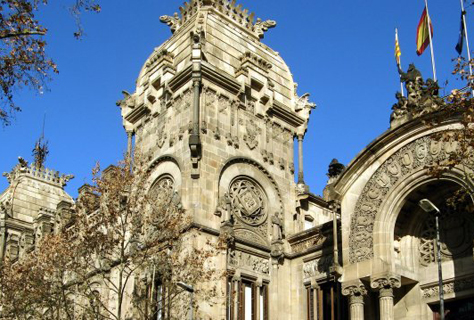14.02.2014 - 12:57
‘The state’s governmental institutions should make a political statement in favor of the right to self-determination of the peoples who want it, because it is a fundamental right, recognized by the Constitution,’ declared Daniel Bartomeus, one of the signers of the manifesto of Catalan judges in favor of the right to decide. He makes it clear that the Constitution not only is not an impediment to the referendum, but establishes that the Spanish government should promote it, as is the case with the British Government with respect to the Scottish referendum. ‘We judges make few public declarations because we are prudent,’ he says, but now it was time to publish this manifesto, which has no similar precedent, to counter many of the messages that negate the right to decide.
The manifesto makes it clear that the referendum on Catalonia’s independence is perfectly legal…
Yes. Now the idea has spread that a poll on the right to decide, or even a binding referendum, would go against the Constitution or be illegal. That is said a lot lately. Well, we, as legal scholars, and judges, we want to say we’ve had enough of people saying these things. Enough already of saying that the referendum is illegal. It’s not. It doesn’t go against the Constitution and it’s perfectly possible and legal. The manifesto clears that up from a legal point of view. The rest of the discussion has to be made in political terms, because the legality of the referendum can’t be denied.
Then, when the Spanish government says it’s illegal, it’s interpreting the Constitution incorrectly?
The Constitution can be interpreted in many ways, that’s true. But these interpretations can only go so far. The Constitution cannot be interpreted against its own principles. And there are two basic principles that the Constitution has. The first is Article 10: the rights and liberties of the citizens must be interpreted in accordance with the Universal Declaration of Human Rights and with other international norms signed by the Spanish State. And indeed, the Universal Declaration of Human Rights, among other things, anticipates the right to self-determination of peoples. The second basic tenet is Article 9. This article demands that the public institutions, in the course of applying rights to people, and to the groups made up thereof, do everything possible so that these are effective and efficient. That is, you, public institution, it’s not enough to recognize some rights and establish them in laws, but you also have to act politically so that these rights are actually effective. That’s what the Constitution says. Therefore, it’s pretty obvious that the public institutions of the State would have to undertake some political action in favor of the self-determination of peoples who demand it, because it is a fundamental right recognized in the Constitution itself.
The key is that Catalonia is understood to be a nation?
Yes, you have to start with the premise that Catalonia is a people and is a nation. But it turns out that, in addition, there is a demonstrated will, which seems to be a majority opinion, of separating, becoming independent. Or at the least to vote on it. Saying that the Constitution doesn’t allow such a thing is to build a brick wall to bash one’s head against.
According to you, it should be the Spanish government that makes the first step toward a referendum?
Judges normally don’t express themselves publicly in this way, through manifestos, but in this case, the legal reason seemed so clear to us that it was important that we spoke out. That is, yes. It’s not true that the Constitution prohibits the referendum, on the contrary: according to the Constitution it should be the public institutions who take the initiative of facilitating the right to self-determination, if there is a group that is asking for it. And from here, and now I’m speaking just for myself and outside the legal sphere, the political powers should come to an agreement. That is, surely, if a ten year plan was made for Catalonia’s independence with a good agreement with Spain, it would be good for Catalonia, good for Spain and good for everyone. I repeat, however, that that’s not my job.
Do you think that this manifesto can help change the position of the Spanish judiciary?
Yes. Of course it can help. Judges are used to reflecting and changing their minds. It’s our job. Actually, our job, as judges, is to say No as we wait for them to convince us that we should say Yes after having listened to both sides. In the end, we’re all colleagues and among colleagues things are read more closely.
For now, about thirty judges have signed the manifesto. Maybe it’s stereotype, but judges are considered to be one of the most pro-Spanish professions in Catalonia…
It’s a stereotype. It’s true that judges have this image, more than pro-Spanish, of being conservative. It’s a traditionally conservative profession, but there are many progressive jurists and there are many that understand the reality that is Catalonia. It’s difficult to evaluate the numbers, but there is a lot of diversity. In addition, there is another important factor, that judges are very cautious and therefore tend not to publish manifestos. That also explains why we are the number we are, thirty. Judges hand down rulings, not manifestos. But this time we found it opportune. It’s a document that we have been working on for a while. And for now we’ve decided to publish it through the media. Soon, we’ll publish it on a platform so that other judges can sign on. And for the moment, there is one magistrate from the Supreme Court, who is Jordi Agustí. There are four of us from the Superior Court of Justice of Catalonia (TSJC), there are several from the Barcelona Cort, and there are also magistrates from outside Barcelona: from Tortosa, Sabadell, Girona, Lleida, etc. And there’s also Josep Maria Pijoan, who just retired, but who also wanted to sign.
We were speaking about the Spanish judiciary. Are you conscious of the fact that as judges, this could be seen as very important from an international point of view?
Yes, of course. But the point of the manifesto is not to have any particular influence either on Spanish legal colleagues, or abroad, or on any political institution. We just want to disrupt this idea that we were just talking about that judges, by definition, go against certain things. What we do is consider, from a legal point of view, the central questions facing a society.
Is the case of Great Britain and Scotland an example of that?
The English have given us another lesson with this. But with respect to this issue, Spain and England have always been different. Since the War with Cuba, in Morocco, what happened in Guinea… Spain has always done it wrong. But England, on the other hand, has known how to manage these things better, although it’s had a conflict with Ireland, but they’ve known how to handle it partly well. With respect to what they’ve done with the colonies, there’s no comparison. They have another tradition. Spain has always been different.




